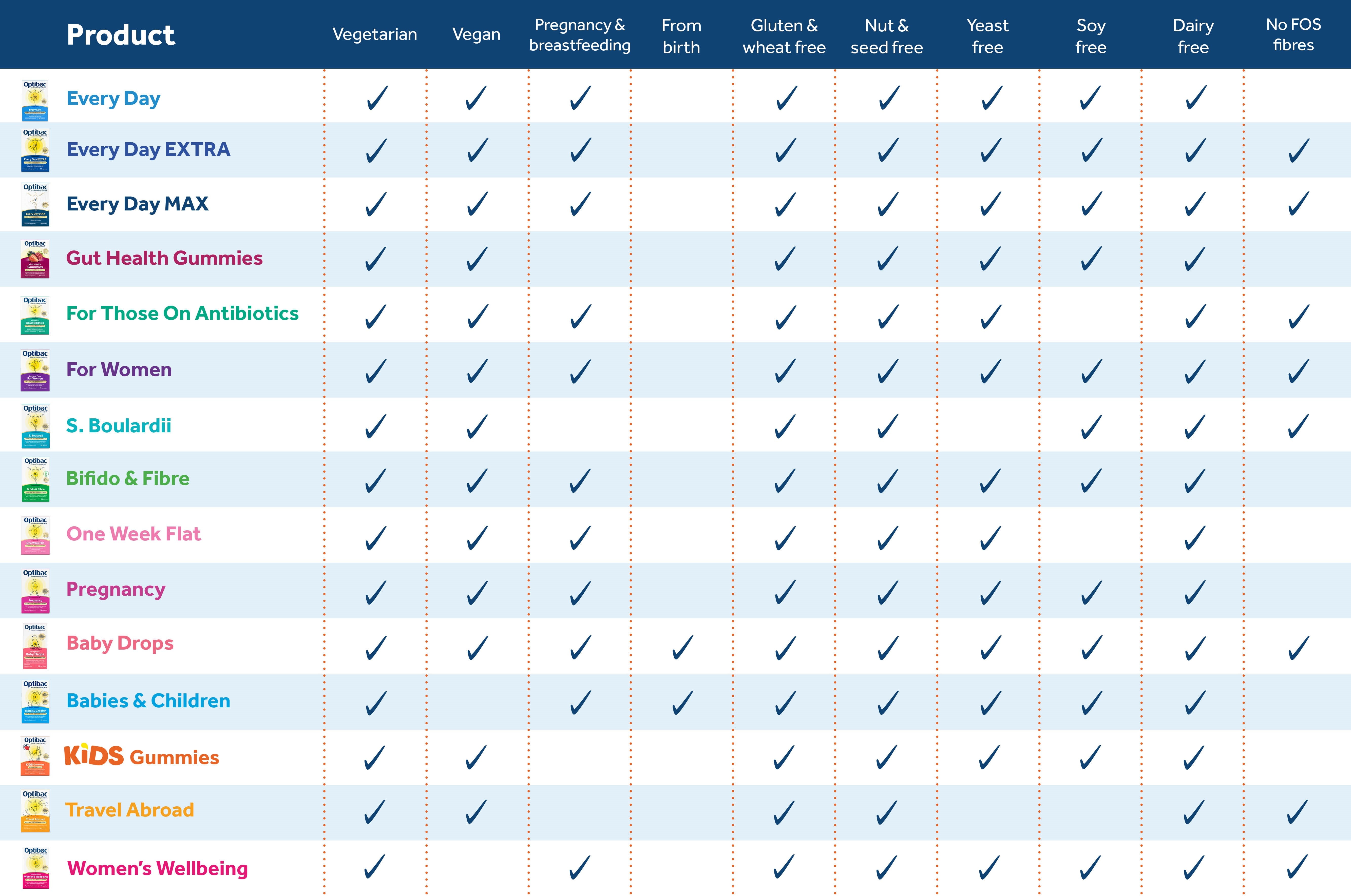- About Us
-
Help
Free 1:1 supplement advice
Not sure which supplement is right for you? Book a free, 15 minute telephone call with one of our nutritional experts.
Book your free consultationGet in touch (Mon to Fri, 9am - 5pm)
Customer Service: +44 (0) 1264 339 770
Order Enquiries: +44 (0) 1264 363 193
Contact us - Stockists
You're away from FREE UK delivery Free UK delivery (applied at checkout) on orders over £10.00
You have qualified for Free UK delivery
Suitability
Can I take live cultures with my diet?
Whether you are following a gluten-free, vegan, keto, paleo or low-FODMAP diet, there is an Optibac supplement for you. Take a look at this FAQ to find which live cultures are suitable for your current diet.
Vegan, keto, gluten-free… How do live cultures fit with my lifestyle?
Diets and eating habits are now more diverse than ever. Gone are the days of straight-forward diet decisions and no longer are we divided into either vegetarians or meat eaters. With #Veganuary breaking records every year and lots of buzz around the celebrity-approved keto diet, healthy eating has never been trendier or more varied!
But what does this mean if you take live cultures supplements? Let’s break down some specific diets and their supplement suitability to help you find the perfect fit.

Core diets
A gluten-free or dairy-free diet is often born out of necessity rather than want, particularly for anyone who has coeliac disease or a dairy intolerance. But we also know that plenty of people decide to avoid wheat, gluten and dairy simply because they feel better for it. Equally, many people choose to follow a vegan or vegetarian diet for ethical reasons; others do so because a plant-based diet makes them feel healthier.
The chart below shows all of our supplements and which of these get the green light for core diets and food allergies.

Specific diets
But what if your diet isn’t quite so clear-cut?
We’re seeing different diets emerging constantly to meet multiple health and/or lifestyle requirements. These can be due to an imbalance of gut bacteria, as part of an exercise plan or a conscious health decision.
Here’s a breakdown of some popular diets and which of our supplements can be taken alongside them:
Low FODMAP diet
A low FODMAP diet removes certain carbohydrates that can upset the gut microbiome of those with IBS-D and other gastrointestinal issues. The FODMAP acronym stands for:
- Fermentable
- Oligosaccharides
- Disaccharides
- Monosaccharides
- And
- Polyols
High FODMAPs can be found in plenty of common food groups including: dairy, wheat and even certain fruit and vegetables!
If you’re following a low-FODMAP diet, all of our supplements are suitable except for Bifido & Fibre, which contains 4g of Fructooligosaccharides, aka FOS fibres.
One Week Flat, Every Day, Babies & Children and Pregnancy also contain very small amounts of FOS (Fructooligosaccharides). However, we know many people happily take these supplements with no problems at all, despite being diagnosed with IBS-D.
You may also like to read: Can I take Optibac on a FODMAPs diet?
Sport & training
We all know that taking regular exercise is great for both mind and body. However, when you push your body to its limits, it needs plenty of recovery afterwards, through food, rest and the right supplements, to repair. For example, even a moderate intake of protein helps with muscle recovery post-exercise.
Keeping your immune system adequately supported also plays a vital role in how well your training goes - you don't want to be knocked out of action with a cold. A friendly bacteria supplement that complements the gut and supports immune health, such as Optibac Gut Health Gummies, is a great staple for your sports kit.
Paleo diet
The Paleo diet is centred around the historical eating of unprocessed foods. Basically, if it comes in a packet with a long list of ingredients on the back, it’s probably not considered Paleo. This diet is great if you want to increase your fibre intake and are happy to keep meat and fish as a key element of your diet.
Because of its diversity, all of our Optibac supplements are suitable for those choosing to follow a Paleo diet.
Low-carb diet
The ketogenic diet, also known as keto, is one of the most popular low-carb diets, having received a lot of attention for its celebrity endorsements and quick weight loss results. The ketogenic diet requires high consumption of fats and proteins (e.g. eggs, greens, cheese, avocados, nuts), versus very low levels of carbohydrates.
Low-carb eating patterns, like the keto diet, can be really helpful for boosting energy levels and reducing hunger cravings. Plus, many advocates of low-carb find it helps with their mental focus and getting a good night's sleep, too. Some people can experience temporary digestive side effects, such as constipation, when switching to a low-carb way of eating. Therefore, we recommend Bifido & Fibre, which has been clinically trialled in those with constipation, but all of our Optibac supplements are suitable with a ketogenic diet.
Find out more about keto and the gut microbiome here, in the Probiotics Learning Lab.
Intermittent fasting
Intermittent fasting is the practice of switching between eating normally and going for extended periods of time without eating, following a regular pattern. Some popular ways of doing intermittent fasting are the 5:2 diet, which involves eating normally for 5 days a week and restricting eating on the other 2 days, and the 16:8 method which is fasting for 16 hours a day, leaving an eating window of 8 hours.
All Optibac supplements are suitable to take when intermittent fasting, including Gut Health Gummies, which at less than 8 calories per gummy, can easily fit into any type of diet. You may wish to take your live bacteria supplement in your 'fasting window' as they are not food supplements - though this is a personal choice.
.png?lang=en-GB)
